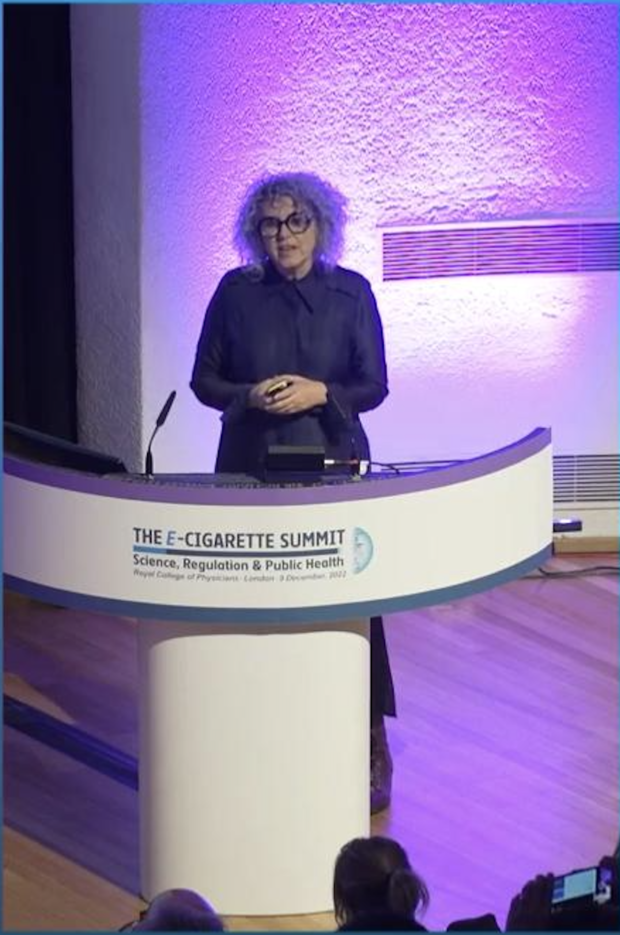Seven-year evidence shows vaping remains far less harmful than smoking

Dr. Debbie Robson, RMN, senior lecturer in Tobacco Harm Reduction National Addiction Centre, Institute of Psychiatry, Psychology & Neuroscience UK.
MANILA, Philippines — Scientific evidence confirmed that vaping causes just a small fraction of the risks of smoking according to a senior lecturer on tobacco harm reduction (THR).
“In terms of health risks, we said that vaping imposes a small fraction of the risk of smoking in the short to medium term. Consistently, vaping exposes people to much lower level, significant lower levels of risk than smoking,” said Dr. Debbie Robson of Queens College London during The E-Cigarette Summit on December 9, 2022.
Dr. Robson, a mental health nurse, and co-author of the annual evidence reviews on e-cigarettes and a trustee of Action on Smoking and Health (ASH), said vaping, while not risk-free, carries a small fraction of the risk of smoking. This was based on the latest independent review commissioned by the Office for Health & Disparities, formerly known as Public Health England, the highest health authority in the UK.
Her team looked at biomarkers of exposure to measure how much of a substance or toxicant is present in the body. The review found that biomarkers are far lower for vaping than for smoking. She said, however, vapes are not risk-free and that it is still better to not vape or smoke.
The purpose of the review is to inform the government and policymakers about the prevalence and characteristics of vaping among adults and young people in England. The latest report included systematic reviews on the health risks of vaping compared with smoking, and vaping compared with non-use, as well as harm perceptions about vaping and smoking.
Article continues after this advertisementIt marked the third time the review looked into the harm caused by smoking and vaping, following the 2015 and 2018 reports. The latest review included international contributions as well as heated tobacco products.
Article continues after this advertisementThe review recommended that in terms of policy, the enforcement of age restrictions instead of regulations on vaping and smoking be improved to reduce access to both products. Dr. Robson also said the increased use of disposables should be monitored and researched with improved regulatory oversight. “Where appropriate, proportionate action should be taken to reduce the appeal to young people,” she said.
The latest report included 413 studies since 2018 and used the list of toxicants identified by the World Health Organization, such as carbon monoxide, tobacco-specific nitrosamines (TSNAs) and volatile organic compounds (VOCs). Results of the meta-analysis show that vaping exposes people to a much lower level of toxicants, compared to the levels of risk in smoking, she said.
Dr. Robson said, however, that the impact of vaping depends on so many things. “It depends on who is vaping, the person’s previous and current smoking history, medical history, and all the comorbidity conditions they’ve got and the reasons that they’re vaping. You also have to take into account where people live and all the background exposure,” she said.
Dr. Robson said the results of the latest review are important for the people who smoke and who vape as well as those who think about taking up vaping.
“How any information is communicated and more importantly how that’s perceived by the user is really important, for the millions of people who smoke, who will die in or living with chronic health conditions while we debate this,” she said.
The 10th-anniversary edition of The E-Cigarette Summit was held at the Royal College of Physicians (RCP) in London on, which also marked 60 years since the RCP first published its groundbreaking report “Smoking and Health”, which laid the foundations for tobacco control.
Participants in the summit concluded that despite decades of tobacco control efforts and public health education on the harms of smoking, the decline in smoking rates has been frustratingly slow and smoking remains the single biggest cause of preventable death.
RELATED STORY:
Int’l scientific studies deny link between vaping and youth smoking